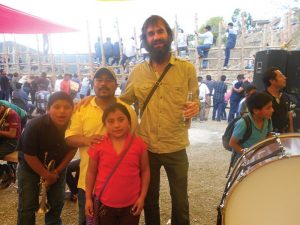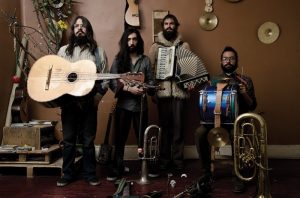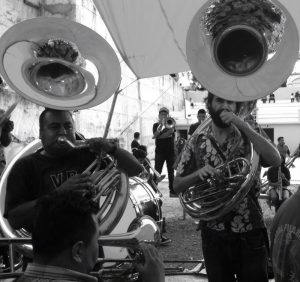Ex-Pat Files: Misha Marks in Mexico City
Ex-Pat Files: Misha Marks in Mexico City
Misha Marks grew up in a very small community near Little Wanganui, on the South Island’s West Coast. After high school in Christchurch he moved to Wellington to study music. For almost a decade now he has been living in Mexico City. With most NZM Ex-Pat Files dealing with musicians in hubs around the world where Kiwis gather to further their career Marks’ choice of home, like his music, seems like a foray into rather new, ‘unexplored’ territory.
What kind of music do you create these days, Misha?
I’m involved in many forms of music-making, primarily in the world of experimental music; free-improvised and composed. But I often find myself in radically different musical contexts, playing baritone horn with Oaxacan brass bands or other forms of traditional music from places like the Balkans, Colombia and other parts of Mexico and the world.
When did you first decide to live somewhere (completely) else? And how did you end up where you did?
When I was 17, living in Christchurch, I thought it would a pretty good idea to live somewhere else, I did an AFS exchange to Spain, where I lived in a town near Barcelona for a year, went to school, learned Spanish and Catalan etc. That sort changed the game for me and opened up a world of possibilities.
After that, I moved to Wellington, did a couple years at jazz school. When I left jazz school I went back to Spain to study Flamenco guitar, spent a while in Vienna and almost a year in London then visited Mexico for a month on my way back to NZ.
That was when MySpace was still a thing. I searched for free-improvised music in Mexico City and found a band called Generación Espontánea. I contacted them and they set up a couple of concerts. We got on like a house on fire, the hang was deep and the mezcal abundant. So when, about 10 months later, back in Wellington, the wonderful saxophonist Blair Latham asked me if I wanted to move to Mexico with him and his family, I thought it over a little and thought, ‘Hell yeah’. I thought I’d give it six months there and see how things went…
Can you remember when you knew you had clicked with the place and would like to stay?
Pretty much the day I arrived in Mexico City. We moved initially to the touristic coastal town of Puerto Vallarta to try our luck there. It was a pretty rough scene. After a month of not finding any gigs, starting to run out of money and a restaurant owner telling us that the smoothest bossa nova we could possibly muster was ‘too abstract’, we began to think perhaps it wasn’t the right place for us!
I was going to go to Mexico City for a week to play with Generación Espontánea again so I decided to get a one-way ticket and try and make it happen in the big city. I arrived at one of the guys from the band’s place, we spent the day playing music and recording, then went out for some drinks, met some more cool people, and I had the feeling I would be sticking around for a while.
How did you cope with the different language?
I already had Spanish under control so it was just a matter of learning Mexico City speak, which didn’t take too long.
Most musicians go overseas in the hope of being closer to their niche market, or at least a Kiwi support network. Did your move help or hinder your career in NZ do you think?
I never really thought about that. It definitely wasn’t a career-motivated decision, I really had no expectations at all. I don’t know whether it has helped or hindered anything, but whenever I go back to NZ there’s always plenty of music to be made, so it seems to have worked out okay.
Improvisación Sonora / Misha Marks from Mario Hernández on Vimeo.
Comparing NZ, Europe and Mexico – where would you say you’re best off as a musician?
 In terms of making a living, it seems like NZ and Europe are quite hard these days. It’s so expensive to live there and it seems most musicians have to have some sort of day job to be able to get by. In Mexico, it is still possible to make a living just from playing.
In terms of making a living, it seems like NZ and Europe are quite hard these days. It’s so expensive to live there and it seems most musicians have to have some sort of day job to be able to get by. In Mexico, it is still possible to make a living just from playing.
That’s not to say it’s easy here, but there appear to be more musicians who just do music and nothing else. Which again is not to say you’re necessarily better off mind you. The most important thing is for there to be a good community of musicians around to do stuff with, which I think is the case in NZ.
What’s your biggest challenge these days?
Organising rehearsals in which everyone in the band can be there at the same time.
At least twice you have moved to a country with an existing, strong music scene. How do you get your foot in the door?
I guess it depends on which door you want to get your foot in! For the sort of music I was interested in it was very easy. You just find some people who are making the music you like, contact them, then hang out and play and everything flows from there. The longer you are around the more people you meet and the deeper you get into the scene.
What’s your main income source there?
 Right now, just playing. In the beginning, I was teaching guitar quite a bit, but now I’ve finally managed to get my number of students down to none. I’ve been lucky to have some good gigs over the last year, here and overseas, so hopefully, that will continue. At times my main income has been busking, which actually can be quite okay and can get you through periods when there is not much work, though I’m happy not to be doing that now.
Right now, just playing. In the beginning, I was teaching guitar quite a bit, but now I’ve finally managed to get my number of students down to none. I’ve been lucky to have some good gigs over the last year, here and overseas, so hopefully, that will continue. At times my main income has been busking, which actually can be quite okay and can get you through periods when there is not much work, though I’m happy not to be doing that now.
What should we make sure to experience when coming to Mexico?
I would recommend going to la Basílica de Guadalupe on the 12th of December, the day of the Virgen of Guadalupe, the supreme religious figure in Mexico. People make the pilgrimage there from all around the country, and you can hear traditional music and dances from all different regions, all happening at the same time in a huge open space. There is no audience as such, the music is played as an offering to Guadalupe, with all due intensity, and the sound of all these bands playing at once is absolutely mind-blowing.
Is there anything that’s similar (or way different) to the music scene in NZ?
 As anywhere there are many different music scenes and each one functions in its own way. I would say where the music is similar, the way things work is probably quite similar. For example in the improvised music world here there is a big DIY element, playing in spaces that aren’t necessarily dedicated venues – houses, parking buildings, galleries, pretty much anywhere that will let us play, which I think is something common to this kind of music in many places. Venues pop up and then disappear and so you have to be creative in finding places to play.
As anywhere there are many different music scenes and each one functions in its own way. I would say where the music is similar, the way things work is probably quite similar. For example in the improvised music world here there is a big DIY element, playing in spaces that aren’t necessarily dedicated venues – houses, parking buildings, galleries, pretty much anywhere that will let us play, which I think is something common to this kind of music in many places. Venues pop up and then disappear and so you have to be creative in finding places to play.
I feel like in NZ there are way more bands, per capita, than in Mexico. Considering the number of people here there aren’t very many bands, bandy bands, with good songs and their own sound. It seems like in NZ you can turn over a cow poo and find a great band.
There are other things of course, like amazing brass bands. For the last six years or so I have been going up to the mountains of Oaxaca to hang out and play with brass bands in village fiestas in the indigenous Sierra Juárez region… now that’s a different scene. Music there is considered a service to the community, it is a totally functioning, living thing that accompanies every ritual in village life, it would take too long to go into it in detail but that is something that works very differently to anything I have ever come across in NZ (or anywhere else for that matter).
You still travel a lot. Where will you be heading in the next few months?
Some concerts in La Paz, Baja California in December (2017) with my band Carlos Marks, then in January and February I’ll be touring Europe and Scandinavia in a duo with the Argentinian singer Sofía Rei, playing the music of the Chilean composer Violeta Parra, whose music I really love. Straight after that, I am planning another tour in Europe playing free-improvised music with a trio based over there. From there I am going back to NZ in March for a visit, then back to Mexico.
